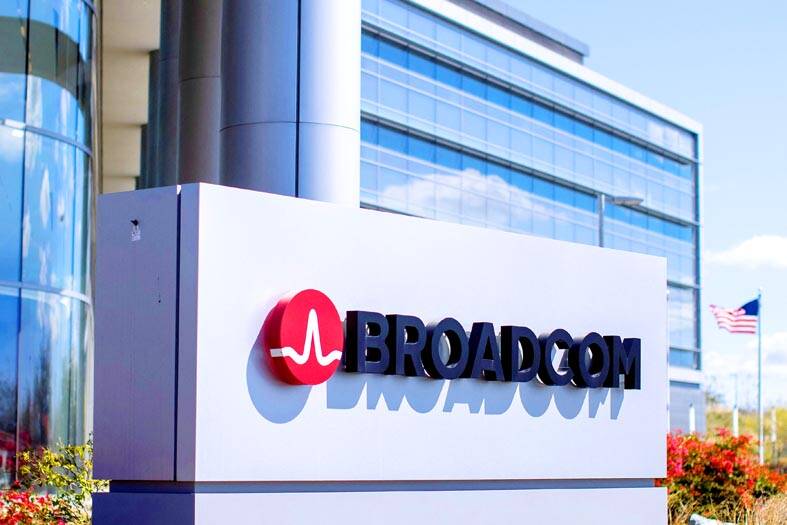Broadcom Inc, a chip supplier for Apple Inc and other big tech companies, rallied in premarket trading after predicting a boom in demand for its artificial intelligence (AI) chips.
Sales of AI products would gain 65 percent in the fiscal first quarter, far faster than its overall semiconductor growth of about 10 percent, the company said during a post-earnings conference call.
The chipmaker also predicted that the potential market for AI components it designs for data center operators would reach as high as US$90 billion by fiscal 2027.

Photo: Reuters
Like Nvidia Corp, Broadcom is positioning itself to be a major beneficiary of the AI spending frenzy. The company has won two major new hyperscale customers — the biggest operators of data centers, Broadcom chief executive officer Hock Tan said.
The stock rose as much as 15 percent in premarket trading on Friday before New York exchanges opened, putting the share price on track for an all-time high if the gain holds when regular trading begins. It had been up 62 percent this year to close at US$180.66.
Investors have piled into Broadcom’s stock this year, lured by AI optimism. The Palo Alto, California-based company had predicted that it would get more than US$10 billion in annual revenue from that market, outpacing other parts of its business. Ultimately, the number reached US$12.2 billion in the last fiscal year.
AI revenue grew 220 percent during the year, fueled by demand for processors and networking components, Tan said.
Demand for non-AI chips would be down in the first quarter, he said, adding that total sales would be US$14.6 billion in the period ending January, in line with estimates.
Tan has assembled one of the most valuable companies in the chip industry through a string of acquisitions. He has also built a software unit that is approaching the scale of its semiconductor operations. That has made the company’s forecasts a bellwether for a broad swath of the technology industry.
Profit was US$1.42 a share in the fourth quarter, excluding some items, the company said. Revenue rose to nearly US$14.1 billion in the period, which ended Nov. 3. Analysts had estimated US$1.39 a share in earnings and revenue of US$14.1 billion on average, according to data compiled by Bloomberg.
Data center providers rely on Broadcom’s custom-chip design and networking semiconductors to build their AI systems. The company also sells components for cars, smartphones and internet access gear. Its push into software, meanwhile, includes products for mainframe computers, cybersecurity and data center optimization.
Broadcom’s semiconductor division had revenue of US$8.23 billion in the fourth quarter, up 12 percent. Software sales grew nearly 200 percent to US$5.82 billion. The company is much larger than it was a year ago, partly because of its acquisition of VMware Inc, which it bought for roughly US$69 billion.
Prior to the report, analysts raised concerns that Broadcom’s chip-design business was suffering from weaker demand. They cited the slower introduction of a new version of a Broadcom processor for Alphabet Inc.
Apple is a top customer of Broadcom, which provides components for the iPhone. During earnings calls, Tan typically gives updates on Broadcom’s often-contentious relationship with that company, which he refers to as his “large North American customer.”

Taiwan Semiconductor Manufacturing Co (TSMC, 台積電) secured a record 70.2 percent share of the global foundry business in the second quarter, up from 67.6 percent the previous quarter, and continued widening its lead over second-placed Samsung Electronics Co, TrendForce Corp (集邦科技) said on Monday. TSMC posted US$30.24 billion in sales in the April-to-June period, up 18.5 percent from the previous quarter, driven by major smartphone customers entering their ramp-up cycle and robust demand for artificial intelligence chips, laptops and PCs, which boosted wafer shipments and average selling prices, TrendForce said in a report. Samsung’s sales also grew in the second quarter, up

LIMITED IMPACT: Investor confidence was likely sustained by its relatively small exposure to the Chinese market, as only less advanced chips are made in Nanjing Taiwan Semiconductor Manufacturing Co (TSMC, 台積電) saw its stock price close steady yesterday in a sign that the loss of the validated end user (VEU) status for its Nanjing, China, fab should have a mild impact on the world’s biggest contract chipmaker financially and technologically. Media reports about the waiver loss sent TSMC down 1.29 percent during the early trading session yesterday, but the stock soon regained strength and ended at NT$1,160, unchanged from Tuesday. Investors’ confidence in TSMC was likely built on its relatively small exposure to the Chinese market, as Chinese customers contributed about 9 percent to TSMC’s revenue last

With this year’s Semicon Taiwan trade show set to kick off on Wednesday, market attention has turned to the mass production of advanced packaging technologies and capacity expansion in Taiwan and the US. With traditional scaling reaching physical limits, heterogeneous integration and packaging technologies have emerged as key solutions. Surging demand for artificial intelligence (AI), high-performance computing (HPC) and high-bandwidth memory (HBM) chips has put technologies such as chip-on-wafer-on-substrate (CoWoS), integrated fan-out (InFO), system on integrated chips (SoIC), 3D IC and fan-out panel-level packaging (FOPLP) at the center of semiconductor innovation, making them a major focus at this year’s trade show, according

DEBUT: The trade show is to feature 17 national pavilions, a new high for the event, including from Canada, Costa Rica, Lithuania, Sweden and Vietnam for the first time The Semicon Taiwan trade show, which opens on Wednesday, is expected to see a new high in the number of exhibitors and visitors from around the world, said its organizer, SEMI, which has described the annual event as the “Olympics of the semiconductor industry.” SEMI, which represents companies in the electronics manufacturing and design supply chain, and touts the annual exhibition as the most influential semiconductor trade show in the world, said more than 1,200 enterprises from 56 countries are to showcase their innovations across more than 4,100 booths, and that the event could attract 100,000 visitors. This year’s event features 17